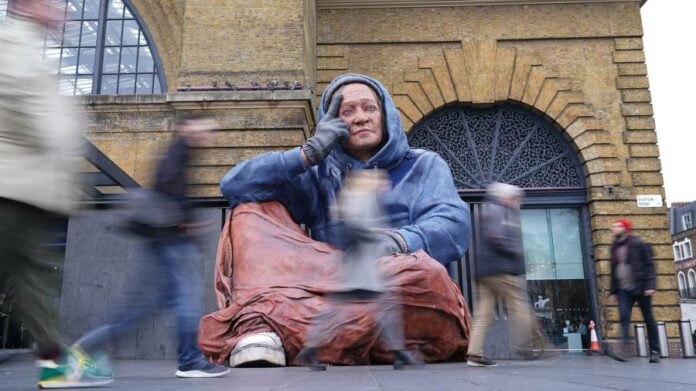The writer is chief executive of Crisis
As we approach Christmas, the situation facing homelessness services in the UK is as bleak as it’s ever been. Temperatures are dropping and, as the days grow shorter, the reality of the cost of living emergency is beginning to bite.
Nearly a million households across Britain expect to face eviction this winter. Four in 10 low-income families will need to skip meals to pay for housing costs. More and more people are being pushed ever closer to the trauma and indignity of homelessness.
In our latest research, Crisis polled 2,000 low-income households across England, Scotland and Wales. The results show the economic and social damage being inflicted on people. It demonstrates how their incomes, and their options, are being squeezed more and more with each day that passes.
But while the figures are deeply worrying, it is the real-life testimonies that reveal the severity of this crisis. In one of the most troubling interviews, a participant discusses the decision to pawn her wedding ring. “I’d had that ring on most of my life,” she says. “I pawned it . . . that month I thought, ‘Great, I’m able to buy a bit of food and maybe pay an extra bill or put some more petrol in the car’, but you can’t keep doing that because I don’t have any more jewellery.”
Some discuss the impossible choices being forced on them — having to decide between food or fuel or housing — as part of their daily routine. Others have to decline offers of help because they cannot afford the cost of travel.
This is a widespread crisis and our services see the impact every single day. A rise in people sleeping in their cars. A rise in families who can no longer feed or clothe their children. A rise in rough sleeping across much of England, with official statistics showing an increase of more than a thousand people between June and September this year.
Perhaps most worryingly, our services are reporting a rise in demand from people who have never encountered problems with their housing before. They arrive, embarrassed and unsure, to say that the pressure on their income has just got too much, and they don’t know where else to go. That includes a rise in people seeking support while in work, with official figures showing that over 20,000 households facing homelessness in England in January to June were in full-time work, more than at any other time since this kind of data collection began.
All of these people are being failed. We and other organisations will continue to support them but while our immediate priority is helping those at risk of homelessness keep their home, the research also shows the deeper damage being done to Britain’s communities. Even for those that will withstand it, the cost of living crisis is chipping away at the strands that add value to our lives.
The government must start to design positive policy around preventing and ending homelessness. New analysis from Crisis and Zoopla shows fewer than one in 12 private properties listed in England last year were affordable within housing benefit levels, yet we know that more than one in three renters are dependent on this benefit to help cover the cost of their rent. Investment in housing benefit would be the fastest and most effective way to head off a rise in homelessness.
Meanwhile, a limit on rent increases, so they are tied to inflation, would immediately reduce pressure on those struggling. In the longer term, government must deliver truly affordable housing to relieve pressure on our communities.
Many of the people we see every day usually just about manage to keep their heads above water, but now find themselves sinking. They are forced to sit and watch as the basic joys in life — being able to afford the bus fare to meet a friend or buy a child a Christmas present — are pulled further and further from their reach. They may not be dying but this is not living either.






